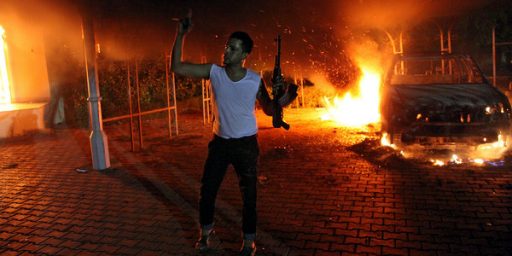Drone Creep and the Rumsfeld Question
My first piece for The New Republic, "Why the Obama Administration's Drone War May Soon Reach a Tipping Point," is up.
My first piece for The New Republic, “Why the Obama Administration’s Drone War May Soon Reach a Tipping Point,” is up. There’s a lot of pieces to it, making excerpting difficult, but here’s a taste:
In a speech Monday at the Woodrow Wilson Center in Washington, John Brennan, President Obama’s counter-terrorism advisor, made a forthright defense of the drone war currently being conducted against Islamic militants in Pakistan, Yemen, and Somalia. “As a result of our efforts,” he declared, “the United States is more secure and the American people are safer.” Brennan’s argument deserves credit for its boldness. Unfortunately, however, there’s good reason to doubt its veracity.
[…]
In a now-famous October 2003 memo, then-Defense Secretary Donald Rumsfeld reasonably figured that the key question in determining whether “we are winning or losing the global war on terror” was “Are we capturing, killing or deterring and dissuading more terrorists every day than the madrassas and the radical clerics are recruiting, training and deploying against us?”
[…]
But there are already signs that the drone campaign there is producing a backlash: Toronto Star national security reporter Michelle Shepard recently highlighted the effects of an infamous December 2009 strike in Abyan province that killed 55, including 14 women and 21 children. Shepard quotes a Yemeni analyst, Abdul Ghani al-Iryani, who attributes the rise of Ansar al Sharia, a key AQAP ally, directly to the outrage over that incident. “Of the thousands of Ansar al Sharia now fighting in Abyan, the majority were not al Qaeda; they were angered by what they saw as American aggression,” Iryani said, calling it “one event that radicalized an entire [province].”
There’s every reason to think the same is true in Pakistan, where the shaky alliance between Washington and Islamabad has been pushed to the point of breaking. CNN terrorism expert Peter Bergen noted last summer that, “On average, only one out of every seven U.S. drone attacks in Pakistan kills a militant leader. The majority of those killed in such strikes are not important insurgent commanders but rather low-level fighters, together with a small number of civilians. In total, according to our analysis, less than two percent of those killed by U.S. drone strikes in Pakistan have been described in reliable press accounts as leaders of al Qaeda or allied groups.” This has clearly taken a toll on public opinion. A major survey conducted in Pakistan by the New America Foundation found that “nearly nine out every ten people in FATA [Federally Administered Tribal Areas] oppose the U.S. military pursuing al-Qaeda and the Taliban in their region” and that “the intensity of opposition to the American military is high. While only one in ten of FATA residents think suicide attacks are often or sometimes justified against the Pakistani military and police, almost six in ten believe these attacks are justified against the U.S. military.”
I should note that, while Brennan’s speech and recent announcement of policy changes are the news hook for this, this is a logical, perhaps even inevitable creep in a longstanding practice. Targeting potential bad guys with unmanned drones with high resolution is awfully tempting. Doing so for top tier leaders is a no-brainer. Drawing the line, though, is hard, and it’s not at all clear one still exists.
UPDATE: For those who aren’t longtime readers, it’s worth noting, too, that this isn’t some new concern on my part conveniently timed to an election year with a Democratic incumbent. See my August 2007 piece “Lawfare Amid Warfare.”
The bottom line is that, whatever international law might allow, any innocent casualties in a counterinsurgency – counterterrorist – counterguerrilla – stability and security operation presents the enemy with a propaganda advantage.
Perhaps because he is an Air Force officer, it seems not to occur to General Dunlap that we can simultaneously “kill bad guys when the opportunity presents itself” and protect innocents by choosing a means of attack other than an air strike. Sending in a commando team can achieve both ends, owing to the more precise nature of that attack. Obviously, commandos are also more vulnerable than bomber pilots. But, as Michael Walzer and others have argued, soldiers have a duty to protect innocent lives even though it means accepting greater personal risks.
Air power, including missile strikes, are oftentimes much more effective than ground attacks. Certainly, countless thousand American soldiers and Marines lived to fight another day because of the invaluable contribution made by military aviation. That said, it has little application in COIN/SASO, where the target set is almost invariably tiny and surrounded by noncombatants.
It’s an alarm I’ve sounded many times over the years, although I do think we’ve escalated to an even more alarming level.







Wasn’t that the Noam Chomsky question, or something, before it was “the Rumsfeld question?”
It is really sad, in this case, how what goes around, comes around.
Hard to take anything that quotes Rumsfeld seriously. Sorry. The man is a fool.
Jimmie Johnson described the Dan Marino problem as a candy store. It was just too tempting, in a tough situation, to rely on his arm…go to the candy store. But relying on his arm came at a cost. And so it is for drones.
Dear Idiot Downvoter,
While it is true, and there has always been a tension, that attacks on any nation create resistance, it is also true that circa 2003 it was a “far left” position, and probably “un-American” to even talk about it.
What we have here is a years-old observation, now voiced by the very person it was voiced against.
Why should he, can he, say these things now?
It’s because the political dance card has been reversed. THAT is what is sad.
I would increase the funding for drone-related activities tenfold. The way I see it they’ve been amazingly successful and the fewer pilots at risk the better.
The answer to the “backlash” problem (a legitimate concern, but also a tautology) is better human intelligence, not fewer drone strikes. You’ve got to get 180 degrees away from the disastrous Torricelli principle. Get inside the belly of the beast in order to slaughter it. We’re doing that now, and have been since 9/11, but it’s still a game of catch up. Better human intelligence means lesser collateral damage.
In “drawing the line” I would follow Team Obama’s lead and I would draw it on the side of incinerating as many Jihadists as practicable. With incinerated Jihadists there’s no recidivism. Some might say that will mean the war will be “endless.” In certain respects that’s true. There won’t be a surrender ceremony, a la September 1945. The other “option,” however, is for the war in any event to be endless, but with a few more 9/11-style calamities.
One important thing to note is that the rules on drone strikes was recently relaxed, so that now we don’t even have to think we know who we’re blowing up, just that they look vaugely terroristy (with “vaguely terroristy” based on bullshit criteria like too many men meeting in one place). The reality is, that at this point there’s really no moral difference between our drone campaign and the suicide bombers. We’re both just running around randomly blowing shit up in hopes of eventually terrifying the populace enough that they’ll do what we want.
@john personna: See my update to the post. Note, too, that Rumsfeld voiced this concern in October 2003. We can argue over whether his own decisions crossed the line he drew; but he clearly understood that it was a balancing act.
@Stormy Dragon: Right. That was the original impetus for the piece, actually, when I pitched it more than a week ago. The editors asked my to use the more recent Brennan remarks as the news hook, which worked out well. There’s a pretty long discussion about the changing rules at the link.
@Hey Norm: That’s the same pathetic logic that makes Republicans disagree with everything Obama says. The fact is, whether Rumsfeld or Chomsky or somebody else said the given quote, it’s a good and relevant question.
Aren’t the Drones really (despite any protestations to the contrary) what the American people want and support?
We don’t want a draft, we want a voluntary military, and we don’t want any American casualties in any conflict. it would appear that Drones are the perfect modern solution to our need for military actions that minimize the possibility of American casualties.
James:
No time to read it right now but I do want to say congratulations on making it into TNR. Very justified success.
Michael beat me to it. Congratulations. Another milestone step for you.
Congrats on the new gig. Well deserved.
For an analysis of ‘drone’ warfare, sir, this is astonishingly poor. Simple reason is that manned aircraft also kill innocents when they bomb ‘suspected insurgents’. Perhaps you address this in the Atlantic piece — which I will read because it is also a daily stop for me. But from the excerpts here you seem to believe that if an F-16 killed those women and children, all would be well.
The question is not whether to use drones or not. The question is whether to use large ordinance or not. From all of your other essays that I have read, it doesn’t seem you would shrink from using large ordinance assuming we had good targeting intelligence. So I conclude you have nothing to say worth reading concerning this subject.
I largely agree with this, but I am not wholly convinced about the radicalization/accident guerilla/Rumseld question argument. As a practical matter, it is very hard to demonstrate that drones are radicalizing people or convincing them to refuse to work with us. Yes, people hate the drone strikes. Intuitively, that should affect behavior. Except that in Pakistan in particular, we’re pushing up against the zero bound of attitudes toward the U.S. It isn’t like the poll numbers you cite have changed dramatically since the uptick in drone attacks in 2008. We’ve always been unpopular. Support for suicide attacks has always been low, but willingness to support attacks on troops relatively high.
Drone strikes have increased more than 5-fold over the past 4 years. But if you look at long-term trends in public opinion or radicalization, you have to squint real hard to see any affects.
That said, your concern about, essentially, normalizing this, and seeing drone attacks not as a “least bad” short-term option, but as a durable core element of U.S. national security policy is right on the mark.
That’s a good point. We’ve been bombing Arabs for so long now that it’s doubtful if drones are making much difference to anybody’s opinion.
Just read the article (in The New Republic of course) and it seems you argue against bombing on the basis of terrorist-like behavior, so called ‘signature’ actions. An example you quote is a truck-load of armed men driving toward the Af-Pak border can now be considered a target.
I will quote what you wrote in The New Atlanticist on 11/21/08: “So, it is quite likely that the terrorists will lose the war — in the sense of failing to achieve their political aims — and yet grow more capable of killing innocents. This state of affairs has been unfortunately termed by Sen John Kerry and others as reducing terrorism to a ‘nuisance’….While al Qaida is on a downward spiral in terms of its appeal to the Muslim world and its ability to achieve its aims (CIA Director Michail) Hayden and his intelligence community colleagues are absolutely right to have the mindset that today is Sept 12th 2001.”
How much difference a change in administration has made!
@James Joyner:
Rumsfeld is a funny guy. I’ll give him credit for that, but it doesn’t deny the political game I am calling out. It is best illustrated, perhaps, here:
In other words, that isolated comments were not part of the general tenor, does not disprove the tenor.
@michael reynolds: @Dave Schuler: Thanks! First time I’ve pitched them but it’s gotten good traction there. As a bonus, NPR and affiliates have picked it up as well under a syndication arrangement.
@Bernard Finel: I agree that it’s damned hard to know to what degree our actions are radicalizing the population. I caveat the hell out of any claims, while nonetheless noting that I fear we’re crossing that threshold.
@JohnMcC: My complaint isn’t about drones, per se, but about missile strikes and targeting decisions. I wouldn’t be any happier with this if we were using manned planes.
@JohnMcC: I don’t see any contradiction. I thought Kerry was right that terrorism was never an existential threat and that our actions had weakened al Qaeda. Politically, though, one can’t use the term “nuisance” to describe their ability to kill innocent American citizens.
And I remain happy that the national security establishment has a 9/12 mentality and are vigilant about those who would do us harm. I’ve repeatedly argued that Obama’s foreign policy is a linear continuation of post-2006 Bush foreign policy and that that’s by and large a good thing. I do, however, lament that our reliance on signature strikes as a tactical measure is having negative strategic effects.
Congratulations, James.
Well deserved, and don’t let the big money change you.
@James Joyner:
Maybe I am too casual a reader at this point, and can’t remember … were you supportive at the start of Iraq and Afghanistan?
Is your position that it is drones, and not those large land wars and occupations, that now “cross the threshold?”
Ding, ding, ding!
The problem pre-dates drones. Drones are only a problem in and of themselves to the extent they make ordering strikes (of dubious value) easier.
The problem is there is no way to know whether our policy is, on net, helping or hurting us. We might have 10 years of safety, followed by a massive terror attack. We’ll never know for sure: a) whether the 10 years of safety was due to our drone strikes; and b) whether future attacks were caused by our strikes.
And that’s without considering the moral implications of it all. Say, for the sake of argument, that we know for sure our strikes are, on net, a plus for our own security. Let’s say they save 1000 American lives. But they will kill, say, 5000 innocent people. Are you ok with that? What if the ratio were better? Worse? Where’s the line?
What I’ve learned over the past ~11 years is that there is no damned line. We’ll kill tens of thousands of people (or more) without any clear evidence that it helps us at all. It’s fairly easy for us to do (now with new and improved robots!), and it’s sure easier than explaining to easily-scared fools that it’s: a) not right; and b) might not even help.
@Bernard Finel:
As you’ve pointed out any number of times, radicalization is hard to measure. Among the many reasons is that there may be a lag time between precipitating events and responses.
Last year, 2011, saw the highest number of civilian casualties in Afghanistan since the U. S. overthrow of the Taliban there. Assuming that we’re still pursuing a counter-insurgency strategy in which a key component is protecting the Afghan people, it doesn’t appear to be working.
@Dave Schuler: Our approach in Afghanistan isn’t working. I am not sure the drone strikes are making things worse however. The entire approach in Afghanistan is flawed.
My take is that drone strikes may be helpful against al Qaeda, and that the evidence that they are harmful is difficult to discern. I don’t think they are having any positive role at all in support of COIN in Afghanistan, so in that case, they are a net negative. No appreciable positives to weigh against possible negatives.
Part of the challenge is that, 11 years into this, we’re still unsure whether we’re after AQ narrowly, radical Islamist generally, or something else.
I wonder if Afghans discern occupation versus drones in any big way, or for that matter whether in the broader Islamic world drones weigh more heavily that those two land wars.
Think about it, we differentiate drones, versus manned fighters, versus boots on ground by our levels of commitment and exposure. That is the “sender’s” view. On the receiving end, you might just care how many houses were knocked down, and how many died.
Or, just to put in another perspective, do drones count more or less than support for the current Israeli government?
@john personna:
If you believe the polling data, that isn’t close. Israel support by far the bigger issue. Though I have to say, I am not sure that is true because there have been swings in opinion data over the past three decades, while support for Israel has been a constant.
Or maybe Israel support sets a base of antipathy and other issues — Iraq, drones, etc. — represent the shifts.
Yes, I imagine, plus other things. How many checkpoints you have gone through. How many times you have felt you’ve been mistreated in your own country, and so forth.
@Rob in CT:
Or just seeing another man’s flag.
One of the ironies is that many people on the right feel Red Dawn in the gut, but don’t imagine that anyone else on earth would feel the same way.
@john personna:
Wasn’t that the idea behind one of Ron Paul’s campaign ads?
It is pretty amazing, actually. You have a great number of people who react with righteous fury at the idea that some egghead gumnit bureacrat in DC might tell them what to do (in their formulation) but expect that Iraqis, Afghans, etc. will react well to a US soldier telling them what to do through an interpreter? WTF?